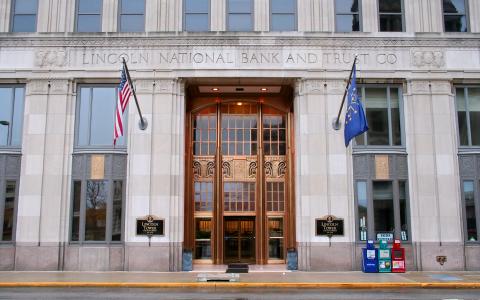
(Bloomberg) - The combination of higher inflation and higher rates has caught up with bank stocks, now on course for their worst monthly performance in more than two years.
The S&P 500 Banks Index has fallen 9.2% in April, on track for its biggest one-month drop since March 2020, erasing about $120 billion in market value.
A spate of supportive first-quarter earnings has failed to boost shares of financial institutions, including Bank of America Corp., Truist Financial Corp. and Fifth Third Bancorp, which have lagged broader markets on a growing realization that the risk of recession outweighs potential gains in margins due to higher borrowing costs.
For some investors and analysts, the slump in bank stocks is particularly confounding as the surge in U.S. Treasury yields, something that would typically help boost shares, is having limited effect. In fact, while the 10-year Treasury yield is sitting near its highest level since 2018, its 40-day correlation with banking stocks has become the most inverted in three and a half years.
“Banks are historically strongly correlated to bond yields direction, but due to recent growth concerns have opened up a gap with yields,” JPMorgan Chase & Co. strategists including Mislav Matejka wrote in a note.
A solid quarter for earnings hasn’t helped with buoying shares. Big banks reported strong trading revenues while also seeing continued net interest income growth. Still, large-cap names including Wells Fargo & Co. and Bank of America have each dropped at least 3% since delivering better-than-expected results this month.
At its annual meeting held Tuesday, Citigroup Inc.’s Chief Executive Officer Jane Fraser said the bank doesn’t expect inflation to derail U.S. growth.
The disconnect between share performance and earnings “is the biggest frustration for many bank stock investors, but it’s also somewhat understandable given rising fears of an economic slowdown/recession,” said Deutsche Bank analyst Matt O’Connor.
That sentiment was echoed by Wells Fargo analyst Mike Mayo, who on Tuesday said he doesn’t understand why Bank of America shares, which are down more than 18% in 2022 versus a 14% drop for the KBW Bank Index, are underperforming so badly this year.
“I can’t believe that with all these interest rate hikes that benefit Bank of America more than any other large bank, that this stock is down so much year-to-date,” Mayo said in an interview with Bloomberg Television.
Brace for Impact
A major driver for bank shares over the coming year will be the Federal Reserve and how it goes about trying to cool inflation, which has surged to its highest level in four decades. The central bank hiked interest rates by 25 basis points in March and traders are currently pricing in more than 200 basis points of additional rate increases this year, including at least three straight half-point bumps.
At Morgan Stanley, strategists downgraded the entire financials sector late in March telling investors to prepare for the possibility of slower U.S. growth.
To be sure, not everyone is counting out a comeback for banking shares.
“While it could take some time to get absolute clarity” on multiple outstanding questions, including if the Fed can engineer a soft landing, “lower stock prices in face of raising earnings estimates and solid profitability metrics, could result in a near-term opportunity,” Barclays analyst Jason Goldberg wrote on April 22.
(Updates share price moves)
By Matt Turner



